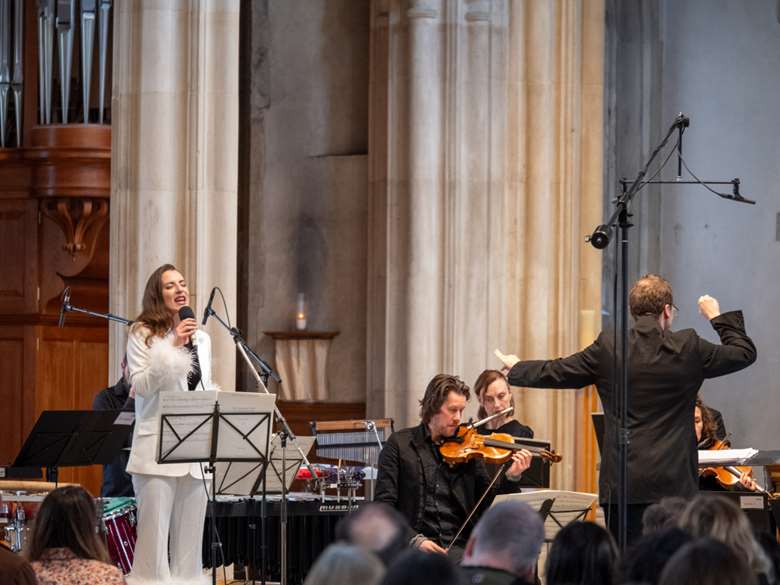Why Britten Sinfonia is prioritising the next generation
Wednesday, October 9, 2024
Learning and participation director Chris Bell explains why Britten Sinfonia’s commitment to talent development never wavered, even in the face of worrying financial instability following the loss of its Arts Council funding

In my role as learning and participation director at Britten Sinfonia, I’m often asked why artist development comes under my remit. My first response is to explain that I view artist development in the broadest sense – are we not developing artists when we create new music in schools in Peterborough or inspiring creativity with dementia groups in Thetford? As a community musician, I’m not convinced the ‘developed artist’ exists or should necessarily be the ambition of organisations to produce. For me, a developed artist is someone who has taken any leap forward in their amateur or professional career. This is something we try to consider across all our schemes at Britten Sinfonia and especially our Opus programmes.
Secondly, whenever I’m asked this question, the word ‘community’ springs to mind. While composing music is one of the great modes of human communication, in today’s climate of budget cuts and threats to the arts we unquestionably need a community of composers and audiences for new music to ensure its survival and growth over the coming decades.
"Risk-taking is built into Britten Sinfonia’s DNA"
In the wake of the devastating cut to Britten Sinfonia’s National Portfolio Organisation (NPO) funding from Arts Council England, we were frequently asked what would happen to our Opus development programmes and the early career composers we work with each year. When new music ensemble Psappha made the difficult decision to close after receiving the same 100% NPO cut, these questions intensified.
 (Image courtesy of Britten Sinfonia)
(Image courtesy of Britten Sinfonia)
I’m delighted to say that almost two years down the line and thanks to the support of our Play On fundraising campaign and support from the PRS Foundation, both Opus 1 and Magnum Opus are thriving. Opus 1 is open to eight UK-based composers over the age of 18 who have not taken part in a similar scheme before – a ‘first step on the ladder’. Magnum Opus is our year-long transformative scheme for more experienced composers, featuring workshops, mentoring, two premiered works and 360-degree interaction with management.
So, why do we do this? Why should we invest funding in the next generation of composers in a climate in which music education is in a state of decline and new music seems to be increasingly devalued by policy makers?
Risk-taking is built into Britten Sinfonia’s DNA, and new music is at the heart of that. In our 30-year history, over 250 works have been commissioned and premiered, and 15 more of these arrive in the 2024/5 season. We relish ambitious projects, unusual collaborations, and working with artists who may not yet have entered the mainstream industry dialogue. If we backpedal on the Opus schemes – evolving in a fluid and responsive way for 15 years now – we risk losing an important part of our identity.
 (Image courtesy of Britten Sinfonia)
(Image courtesy of Britten Sinfonia)
The importance of our Opus programmes pivots on the broad view we take on the role of composers in society, and how we deeply value real life experience as well as educational achievements. Magnum Opus composers receive coaching and mentoring on topics ranging from fundraising to librarianship and we continue to engage them in arranging and creating new works for performances in community settings, following their time on the scheme. For instance, Magnum Opus alumni are currently working with workshop leader Aga Serugo-Lugo in schools in Thetford and Bury St Edmunds. Additionally, singer-songwriter alumna and TikToker, Crystalla Serghiou, is working with James Redwood and pupils in Peterborough to create a new composition toolkit for teachers. Composers have a unique ability to communicate their feelings and ideas through music, and I believe this should be harnessed and encouraged in school settings.
"Why should we invest funding in the next generation of composers in a climate in which music education is in a state of decline and new music seems to be increasingly devalued by policy makers?"
My favourite aspect of Opus 1 is the diversity of applications we receive each year. The absence of any age limit brings forward an extraordinary variety of composers from all walks of life, and across the generations. Last year, we welcomed Janet Wheeler, an experienced composer of music for choirs, who had received limited opportunities to write chamber music to that point, and James Preller, an extraordinary 17-year-old who had recently finished their A Levels and was contemplating their next move. Seeing them work together and give feedback was one of the highlights of my year and the reason why the word ‘community’ jumps to mind so powerfully when I think about the scheme.
New music performances are places of community, where you can meet people from all walks of life, and with different things to say through their music. Our recent Opus 1 showcase in the beautiful surroundings of ‘The Painted Church’ (All Saints) in Cambridge was one such experience. Our next Magnum Opus performance culmination is in St Giles Church, Cripplegate (London’s Barbican) on 2 November. It will be a wonderful and warm meeting place for composers, their friends and families, and for the sharing of musical ideas and exploration.
Britten Sinfonia presents its Magnum Opus Composer Showcase on November 2nd at St Giles Cripplegate, London. Tickets can be found here.




